Boy Who Accidentally Dropped His Phone On His Cat Turns To Reddit To Unload His Guilt
Do cats hold grudges after their humans hurt them? We all make mistakes and do things we later regret, so it's natural to wonder if cats resent their owners when they are accidentally hurt.
The good news is that cats recover quickly from one-time events, so don't worry too much! According to experts, cats remember real accidents for up to 16 hours.
In other words, your relationship with your cat won't be easily broken by that one incident. These felines won't sever their connection with you just because of a minor accident.
However, what cats do remember is the abuse and mistreatment they've experienced. Those events can traumatize them for the rest of their lives.
If they find themselves in a situation that endangers their lives, it will be stored in their long-term memory. This helps keep them safe from harm.
A young Redditor recently shared an incident involving him and his cat. According to the 12-year-old, he enjoys scrolling through social media while cuddling with his cats.
During one of his relaxing moments with his cat, he accidentally dropped his phone on the skittish feline. He didn't mean to hurt his cat, but he felt incredibly guilty about it.
So, he unloaded his thoughts on Reddit. Cat lovers responded to the cute and wholesome post, assuring him that his cat would eventually forgive him.
A guilty young Redditor shares what happened during his and his cat's cuddle time.
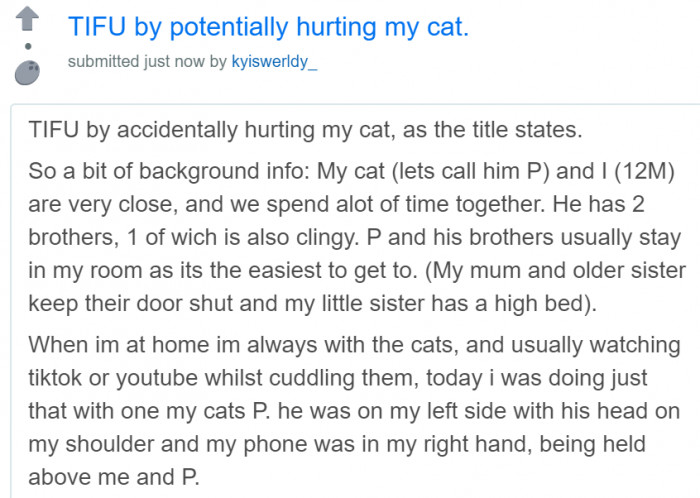
It was just an accident.
The kid meant no harm. However, the problem is that the cat won't go near him.
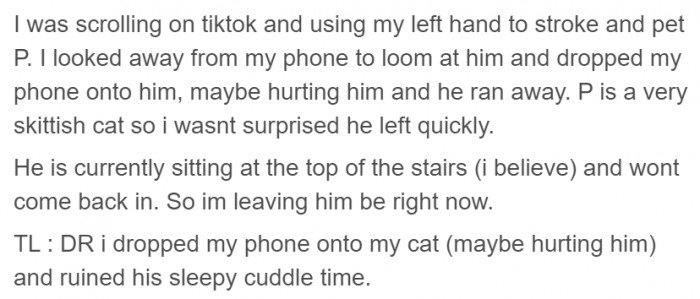
Reddit users comforted the boy, saying that the cat will eventually get over the accident.
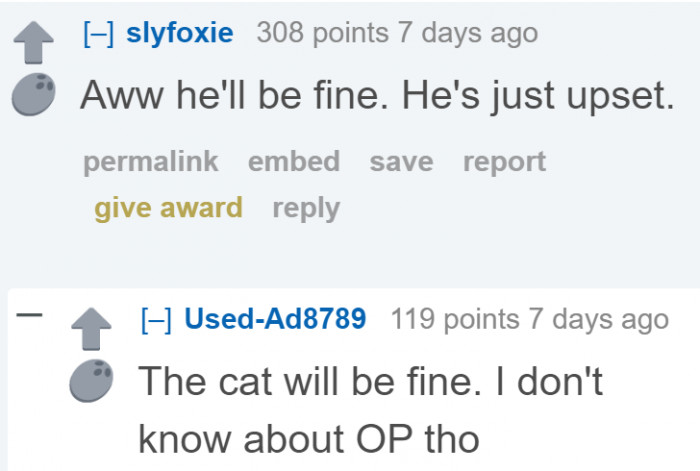
Guilt and Responsibility in Pet Ownership
The feelings of guilt experienced by the boy after dropping his phone on his cat reflect a common psychological response to perceived wrongdoing. According to research from Harvard Medical School, guilt often arises from our internal moral compass, leading us to feel responsible for the well-being of others, particularly pets. This emotional reaction can be particularly intense in young individuals who are still developing their understanding of responsibility.
Recognizing these feelings is an important step in processing guilt and moving toward forgiveness, both of oneself and for the situation.
Exploring Guilt in Pet Ownership
This situation illustrates the emotional complexities of pet ownership, particularly when accidents occur. Dr. Linda Green, a clinical psychologist at Duke University, points out that feelings of guilt can arise from the deep sense of responsibility pet owners feel toward their animals. This guilt often stems from the bond formed between pets and their owners, where the desire to protect and care for the pet is paramount.
Research shows that guilt can serve as a motivator for change, pushing individuals to reflect on their actions and make amends. A study published in the Journal of Experimental Psychology found that guilt often leads to prosocial behavior, as individuals seek to rectify their perceived wrongs.
People understood the kid's guilt.

A Redditor shares a funny incident, wherein the dog blames him for the accident he didn't cause.
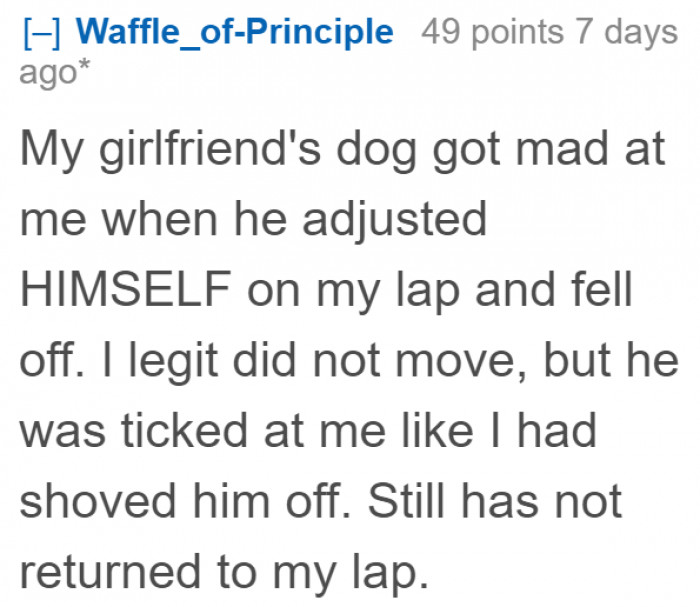
Redditors reacted to the doggo story above.

Moreover, understanding that accidents happen can help individuals navigate feelings of guilt more effectively. Research in developmental psychology indicates that children are more likely to internalize responsibility for unintentional actions, leading to heightened guilt. Encouraging discussions about empathy and forgiveness can help children learn to cope with these emotions and foster resilience.
Practicing self-compassion is equally important, as it allows individuals to recognize their imperfections and accept that mistakes are part of life.
Furthermore, the emotional impact of such incidents can be exacerbated by societal expectations surrounding pet ownership. Many owners believe they must provide an ideal environment for their pets, leading to increased pressure and anxiety when accidents happen. According to a study from the Journal of Social Psychology, these societal pressures can amplify feelings of inadequacy, making it crucial for pet owners to practice self-compassion.
Understanding that accidents happen can help alleviate guilt and promote a healthier emotional response, allowing pet owners to focus on constructive actions rather than dwelling on mistakes.
As you may have noticed, the boy kept his cat's identity hidden.
How cute!
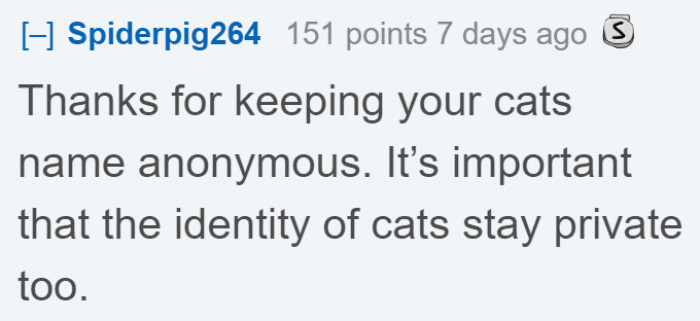
We hope he'll be fine soon!

Cats forgive and forget.
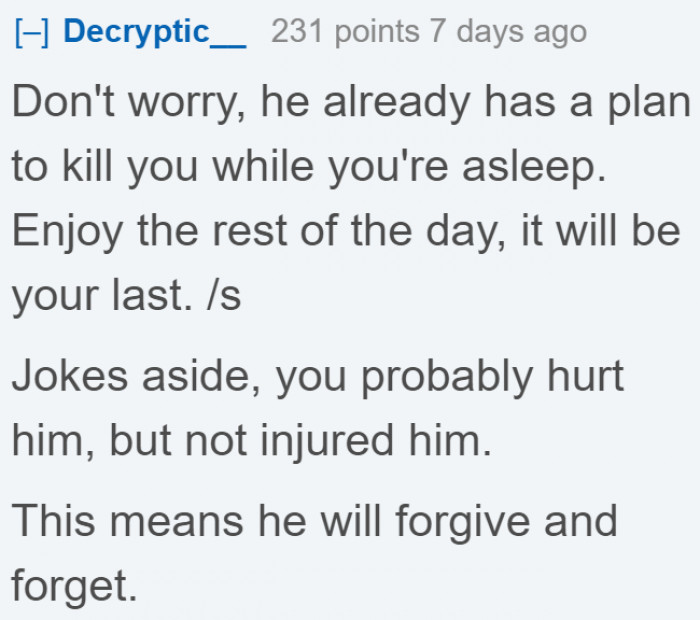
The Emotional Bond Between Humans and Pets
This situation also underscores the profound emotional connections that exist between humans and their pets. Studies show that pets can significantly enhance emotional well-being, providing companionship and support during times of distress. This bond can heighten feelings of responsibility and guilt when an accident occurs, as seen in this scenario.
Understanding the depth of this emotional connection can help individuals navigate their feelings of guilt and reinforce the importance of compassion toward both themselves and their pets.
Practical Strategies for Managing Guilt
To cope with feelings of guilt, pet owners can benefit from reflection and self-forgiveness. Engaging in mindfulness practices, such as meditation or journaling, can help individuals process their emotions and develop a more balanced perspective. Research from the Journal of Positive Psychology emphasizes that self-forgiveness can lead to improved emotional well-being and resilience.
Additionally, discussing feelings with supportive friends or family members can provide reassurance and help normalize the emotional challenges of pet ownership. This support network can be instrumental in mitigating guilt and fostering a sense of community among pet owners.
The skittish cat just needs some time and space.
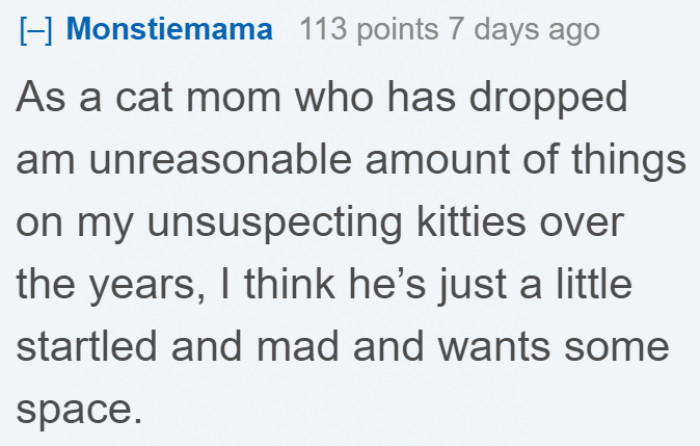
Another funny experience.
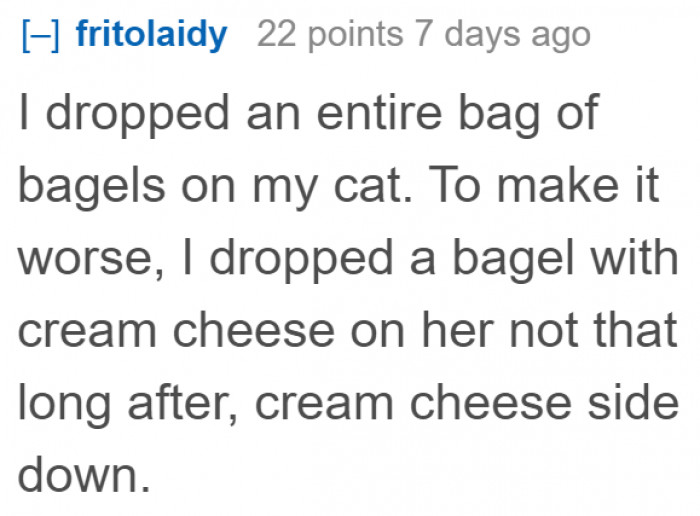
A concerned Redditor's gentle reminder to the kid
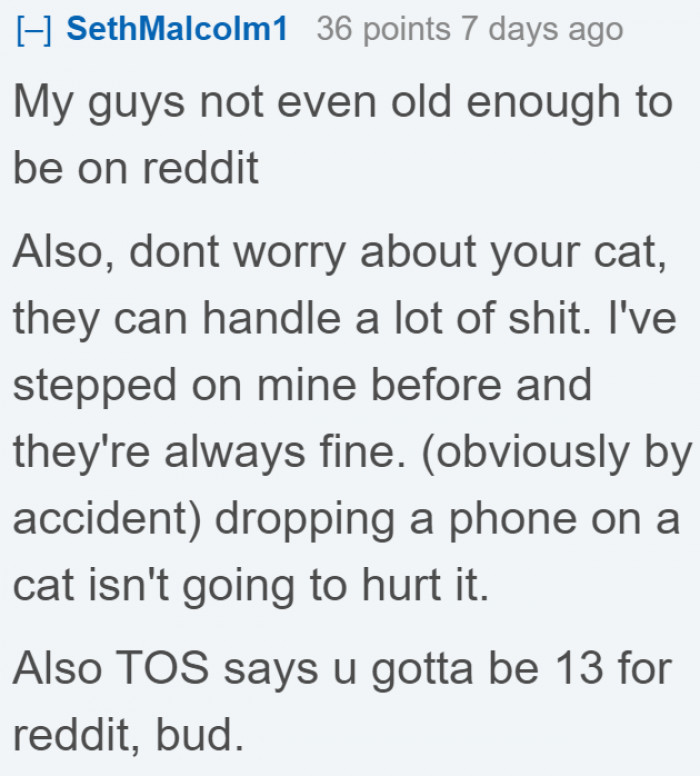
Furthermore, focusing on proactive measures to prevent future accidents can empower pet owners and alleviate feelings of guilt. Implementing training techniques that teach pets boundaries, as well as ensuring a safe environment, can reduce the likelihood of accidents occurring. A study published in the Journal of Veterinary Behavior highlights the effectiveness of positive reinforcement techniques in modifying pet behavior.
By taking responsibility for their pet's training and well-being, owners can transform feelings of guilt into proactive, constructive actions.
He probably needs to make it up to the cat using treats.
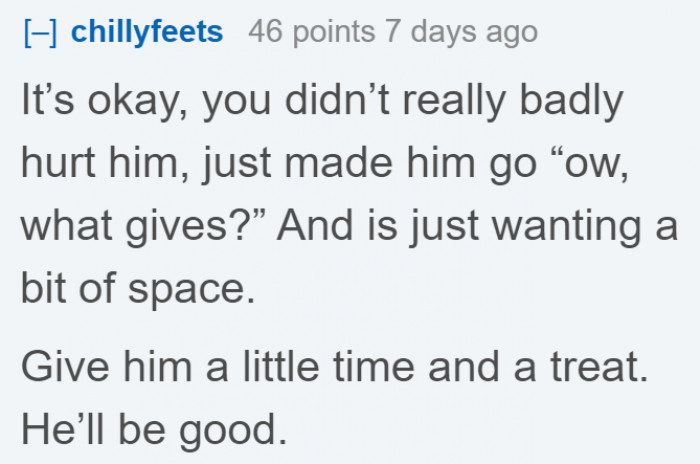
We hope the cat's fine!
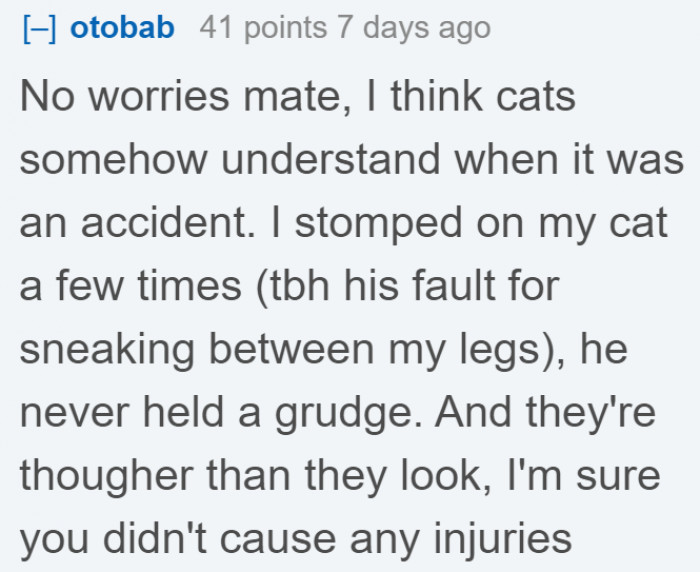
A sad story
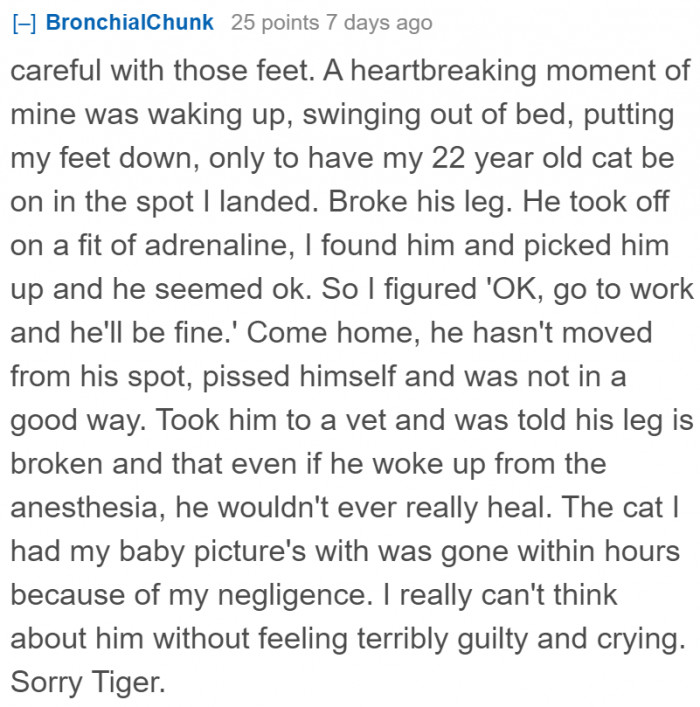
Be extra careful with black cats and dogs when in the dark.
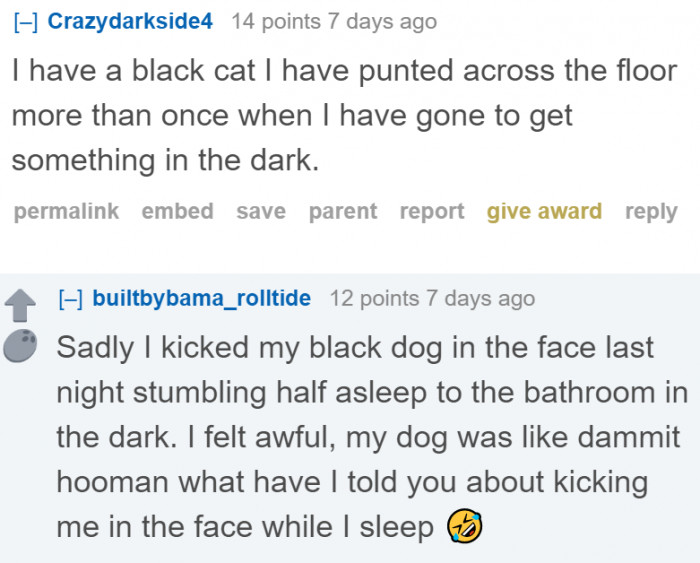
We agree!

Redditors find the censoring effort so wholesome.

There's bound to be an accident when you're holding your phone and your cat.
So always be careful!
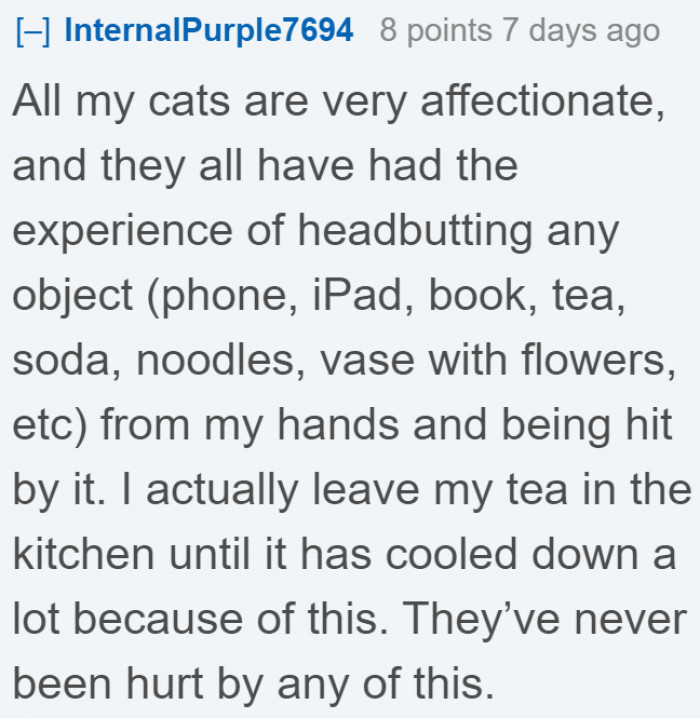
We wonder how P the cat would react.
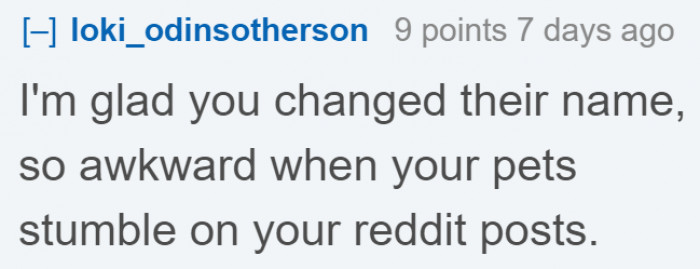
He just needs to make it up to his cat, and they'll be close again.
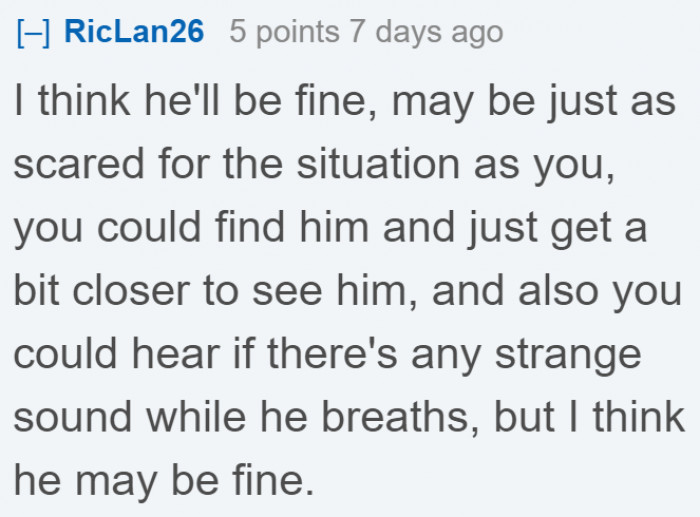
So how do you restore a close relationship with your cat after an accident? Experts say that cat owners shouldn't force affection on their cats.
It's easy to be tempted to do so. After all, we love our pet cats so much.
However, being in a hurry to smooth things over might backfire. So don't worsen the problem by forcing them to be held or petted.
Instead, in subtle ways, motivate your feline to be close to you. At mealtimes, for example, sit several feet away from your cat's food bowl to encourage your cat's approach without aggressively pursuing them.
Psychological Analysis
This scenario reveals how deeply intertwined emotions can be when it comes to pet ownership. Guilt, while a natural response to accidents, can be managed through reflection and self-compassion. Encouraging open dialogue about these feelings can help pet owners feel less isolated and promote healthier emotional responses.
Analysis generated by AI
Analysis & Alternative Approaches
In conclusion, this situation illustrates the complex emotions that arise from pet ownership, particularly guilt. Research emphasizes the importance of self-forgiveness and proactive strategies in managing these emotions. By focusing on constructive actions and building supportive relationships, pet owners can navigate guilt more effectively.
Analysis & Alternative Approaches
In conclusion, navigating feelings of guilt in pet ownership requires understanding and compassion. By recognizing that accidents happen and fostering a supportive dialogue about emotions, individuals can cultivate resilience. Ultimately, nurturing the bond between humans and pets can lead to more fulfilling and empathetic relationships.



